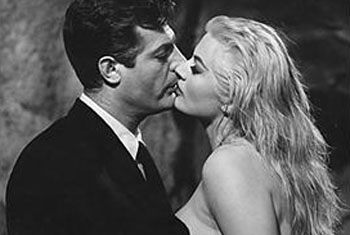Federico Fellini is a brilliant filmmaker who has a unique style. La Dolce Vita” is wonderfully crafted, with gorgeous black & white photography, exceptional direction of actors and unconventional but engrossing storytelling. One of the great things about this movie is how it reveals its themes only gradually, as you grow more and more involved in it. For most of this near 3 hour long picture, it’s hard to discern a clear storyline. It opens with the striking sight of a statue of Jesus Christ hanging from under an helicopter flying over Rome. Then we meet the film’s protagonist, Marcello (compellingly portrayed by Marcello Mastroianni), a disillusioned reporter who’s trying to write a novel. He’s suave but bored, and confused. Through the film, we follow him from one place to the next, in more or less interlocking situations, as people go in and out of the picture, like in real life.
Marcello is engaged, but he doesn’t really wanna get married. It doesn’t even look like he loves his wife, who kind of represents losing his freedom. Hence, Marcello is always out living la vida loca around Rome, womanizing, which I think are only ways for him of trying to hide his fear of taking the responsibilities brought up by real life and true love. He prefers to convince himself that the shallow glamour and permissiveness of his lifestyle and the endless string of women he flirts with have meaning. Fellini follows his character through various nights out, which the Italian director shows as wild but unfulfilling. Marcello drives around with a brunette, picks up a strange woman and take her home. The next night, Marcello does everything he can to woo an American starlet, who rouses his lust with her blonde locks and her big boobs, but she has the shortest of attention spans and disappears after a kitty or a fountain whenever he’s about to make a move. Plus, she’s married to a Yankee actor, and she seems to have a thing for a freaky bearded guy who dances devilishly. Then there’s a reporting job in the country where two kids pretend the Virgin Mary appeared to them. Marcello also spends an evening with pseudo-intellectual, self-proclaimed high society people who are rich but bored with their easy living, and another in a cabaret with his dad who keeps flirting with one of the dancing girls (must run in the family!).
Through all this decadent mess, a few characters have a bigger influence on Marcello: an old friend who seems to have everything going for him but who’s still tormented, a whore who thinks she loves him and, in a more subtle way, a teenage girl who looks just like an angel. I’ll tell you right now, in no way whatsoever do I pretend to fully understand this movie. It sometimes feel existential, or like a social satire at times. What’s for sure is that it’s bluntly, sadly fascinating. Part of the appeal is how you can feel that there’s something to be found, therefore you want to watch the film over and over. I’m sure some will be put off for the same reason, because the film doesn’t offer clear resolutions. But there’s something infinitely interesting in a film which lets you fill the holes with your own thoughts and feelings, which you can make your own. “La Dolce Vita” is the kind of movie you wanna grow old with.

